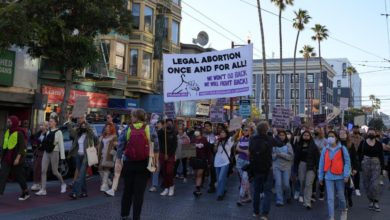For almost two weeks straight, hundreds of thousands of Polish women have marched through the streets of Warsaw and other major Polish cities, protesting the right-wing government’s move to ban access to nearly all abortions. The decision is part of a decades-long assault on reproductive rights going back to the overthrow of socialism in 1989.
On October 31, an estimated 100,000 protesters marched in defense of abortion rights after the Constitutional Tribunal, the nation’s highest court, ruled on October 22 that abortions for reasons of fetal abnormality violated the Polish constitution. It was the tenth day of mass protest against the ruling.
Poland already had some of the most restrictive abortion laws in Europe – permitting termination of pregnancy only in cases rape, incest, risk of death to the mother, or if the fetus is guaranteed to be stillborn. Even worse restrictions would have been implemented had a militant women’s rights movement not prevented them from coming to pass. In 2016, a proposed anti-abortion law was abandoned after 30,000 women went on strike against it, and a second attempt in 2018 met the same fate. The ongoing protests began on October 22 following the court ruling in much the same way.
In cities across Poland such as Wroclaw, Gdansk, Lodz, and Siemiatycze, women poured out of their offices, places of work, and schools and into the streets in a massive work stoppage.
“We’re prepared to fight till the end,” Marta Lempart, one of the strike leaders, told the Associated Press on Friday. She said their goal is to force the resignation of the government and the reversal of the Tribunal’s ruling.
The protesters marched on Saturday to the home of Jaroslaw Kaczynski, leader of the right-wing Law and Justice Party that controls all branches of the Polish government. Protests also occupied highways, squares and streets across the capital.
The protests are already having an effect: President Andzrej Duda, also of Law and Justice, proposed a new law on Friday that would permit abortion in some cases of fetal abnormality.
However, the protests are also opposed by strong right-wing forces who have positioned the reproductive rights activists as trying to “destroy the Polish nation,” as Kaczynski said on Wednesday during a parliamentary speech calling for martial law against the protests. The leader of the fascist National-Radical Camp has called for a “Catholic self-defense” force to confront what he calls “neo-Bolshevik revolutionaries.”
Under the socialist Polish People’s Republic, abortion was available to women on demand, and it was common for women to travel there from capitalist countries with more restrictive abortion laws in order to exert autonomy over their bodies. However, the right-wing forces who overthrew the socialist government in 1989 rallied around Catholic bishops who demonized abortion, and the restoration of capitalism brought with it an extremely restrictive anti-abortion law in 1993.
A similar situation existed for LGBTQ people in Poland: the socialist government had no laws discriminating against LGBTQ people, but this tolerance was also used by fascists to demonize the socialist state. Today, huge swaths of the country have been declared “zones free of LGBT ideology,” and Duda has called LGBTQ rights “even more destructive” than communism. Likewise, the organization “Solidarity”, which led the movement to overthrow socialism, recently slandered LGBTQ rights as “a neo-Marxist ideology” and openly called for discrimination against LGBTQ people.
The conjunction of women’s reproductive rights and the rights of LGBTQ people is no accident: the struggles are closely linked and the universal hostility to both by reactionaries, as well as the major advances for women and LGBTQ people proven possible under socialism, show that these rights cannot be protected unless working and oppressed people are put in charge of society.





